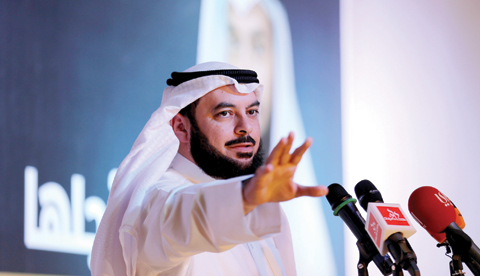 KUWAIT: Kuwaiti opposition leader and candidate Jamaan Al-Harbash speaks during a campaign meeting in Kuwait City Tuesday evening. Kuwaiti opposition groups are aiming for a comeback in parliament after a fouryear election boycott, seeking to reverse what they see as the deteriorating political situation in the Gulf state. — Photo by Yasser Al-Zayyat
KUWAIT: Kuwaiti opposition leader and candidate Jamaan Al-Harbash speaks during a campaign meeting in Kuwait City Tuesday evening. Kuwaiti opposition groups are aiming for a comeback in parliament after a fouryear election boycott, seeking to reverse what they see as the deteriorating political situation in the Gulf state. — Photo by Yasser Al-Zayyat
KUWAIT: It is interesting to see with every parliamentary elections that there are some people who are 'silent' and not interested in voting for candidates, and if they do vote they would surely turn some tables. Candidates try their best to bring those silent people and lure them to vote and exercise their right for the upcoming parliamentary elections of November 26 in order to determine the nature of the next parliament through adoption of numerous realistic programs that cope with the current pressing regional, domestic and international issues, besides meeting ambitions of this segment.
Such group of people are called differently in every country, where some call them the 'Silent Majority', 'Hesitant or Negative' and in Egypt they are called the 'Couch Party'. This category of silent people are estimated between 10-50 percent according to semi-official statistics as their participation is linked to their mood, timing of the elections and to the nature of issues being addressed on the political and media arenas.
Nonexistent
Political researcher and academician Dr Ayed Al-Mannaa said that the silent majority in its political approach does not exist in Kuwait, however, there is a large number of people who have no interest in politics or in elections, but can make a change in the elections. He added that such group is also found in the rest of the world and is becoming a target for candidates once they decided to break their silence and take part in presidential or parliamentary elections' process.
Manaa attributed their rejection to take part to psychological, political and religious matters or to the failure of politicians to reach out for them and lure them into participating. He said that such hesitant or silent group could heavily impact the elections and determine the identity of the next parliament should they decided to go ahead and vote. He pointed out that the single-vote system has given a big incentive for the voter, a matter that prompted candidates to seriously think of snatching votes of all with no exception.
Negative
Meanwhile, Professor of Political Sociology Dr Mohammad Al-Rumaihi said that the concept of silent majority has a negative consequence on the entire society and on the political reality in particular, saying such a group has no interest in politics and does not want to contribute to it. He asserted the role of the individual to actively take part in the development of the country, chiefly in the political process, calling for selecting the best candidate. - KUNA

